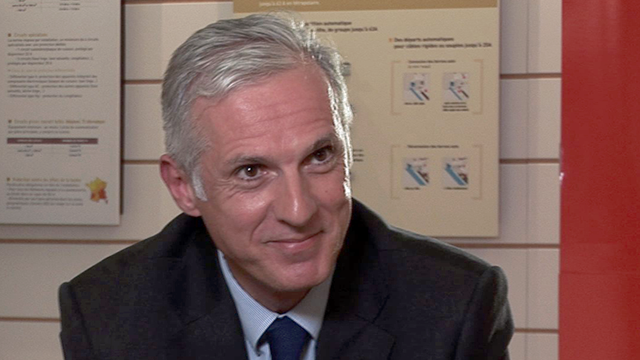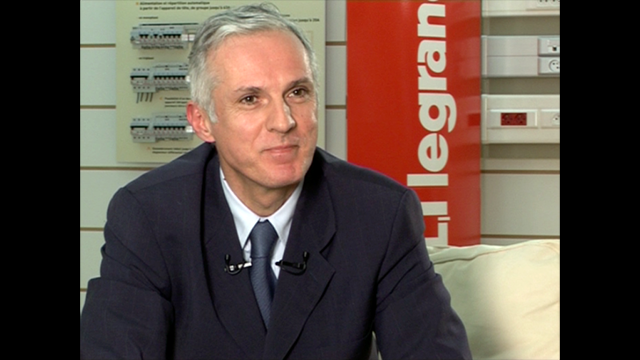EuroBusinessMedia (EBM): Legrand, the world leader in products for electrical installations and information networks is reporting profit for the first half of 2008. Gilles Schnepp, welcome. You are the Chairman and CEO of Legrand. What would you say are your key achievements in the first half of this year and what is your outlook for the rest of the year?
Gilles Schnep (GS): Well first, Legrand was able to achieve a performance which is really, for the first half of 2008, close to its overall expectations. If we’re talking of sales growth first, we’ve achieved 6.6% growth - excluding exchange rate but including acquisitions - so made of, respectively 3.1% for organic growth and 3.5% for acquisitions, and as far as organic growth is concerned, it’s clear that all the activities that we have in emerging countries have been extremely supportive. So that’s for sales. As far as margins are concerned, we showed a healthy resilience in operating margins, because actually we were on par compared to last year - 17.9% adjusted operating margin - and we’ve also shown a firm increase in net income, plus 19%. So based on the strength of these first half figures, we target a sales growth - same logic: including acquisitions, excluding exchange rate - of close to 7% for the full year 2008 and we confirm our objective for an adjusted operating margin percentage close to that of 2007 which, I remind you, was 17.5%.
EBM: Now, while on the one hand raw material prices are skyrocketing and on the other hand residential real estate and building is plummeting, what is Legrand’s strategy to hedge against such evolution in the market?
GS: Well, maybe one remark before we answer your question. Renovation accounts for 60% of our total sales. Furthermore, commercial and industrial applications represent 60% of our total sales, so it means that residential, new building activity is a minor part of our total activity throughout the world. This being said, what do we do to counter the slowdown in mature economies? First of all we work to develop our position in emerging countries, again in the first half of 2008 we’ve enjoyed great growth - 14% in those countries - and more interesting is the fact that almost 50%, precisely 47% of our activities in emerging countries are made as a leader, as a number one. So it means that we derive from those emerging countries’ positions a great profitability, actually comparable to the profitability of the group. So one is geography, two is product segment. We work on product segments which are fast growing, like energy efficiency, like VDI/Datacom, like Wire Mesh or power distribution and in those activities we enjoy double digit growth on average, and those activities represent 20% of our total worldwide activities. And last, we have always been able to achieve good pricing, through a good pricing power in our markets and 2008 is no exception to this, and we have been able to pass on a 2% price increase so far in our catalogues throughout the world on average. All this is aimed at countering the slowdown in mature economies, but we also act to defend margins and we, typically - and this is the culture of Legrand – we continuously improve productivity, through cost cutting, adjusting expenses, and clearly the culture of Legrand is a culture of continuous improvement and the ownership of private equity has clearly reinforced this culture over the last four years.
EBM: Would you say that this strategy works in the US?
GS: It does, it does. Of course, I would not challenge the fact that the residential market is in a very difficult position in the US - and this started actually from the second semester of 2006 - so it’s already two years that this market on the residential part is in bad shape. This being said, we are growing fast on other segments; the residential activity represents 30% of our activities in the US, but all the commercial and industrial applications represent 70% - so the vast majority of our total sales - and on this segment, we enjoy fast growth on certain segments, like energy efficiency, with the Watt Stopper, which is the leader in all these products that help save energy in commercial applications. The same goes for PW Industries and Cablofil®, which are cable management products which enjoy fast growing activities. So altogether, I think that we are partly offsetting the decrease in the residential sector and as far as margins are concerned, we’ve been able to maintain, even increase our margins over the last two years in the US, despite this unfavourable residential segment.
EBM: Are you still pursuing your acquisition or external growth strategy at the same brisk pace as last year?
GS: Yes we do, definitely. You know that we are active in a market that we consider represents about 60 billion euros worldwide, and a half of the 60 billion is represented by medium to small sized companies that can typically be targets for Legrand’s acquisition policy. In the case of 2008, so far we’ve made four acquisitions, and these four acquisitions are either in emerging countries, like Estap in Turkey or HDL in Brazil, or in mature economies, but on the segments which grow fast, which is the case of Electrak in the UK and PW in the US. All these four acquisitions will bring about 4% additional growth to Legrand and the specificity of the Legrand business model is that those four companies have been purchased from our own financial resources - I can call it self-finance - which is typical of the normal growth of Legrand; both organic and acquisitions.
EBM And finally, given Legrand’s performance, what would be your comment on the recent decline in the share price?
GS: You are obviously referring to the -20% which is the share price performance since Legrand’s IPO in April of 2006. During the same period we have increased our sales by 29%, our adjusted EBIT by 45%. So you see there is a great discrepancy between the financial performance - the stock performance of Legrand - and its economic performance. I believe all classes of assets have suffered the same, because the stock market doesn’t like economic uncertainty. What I believe and am convinced of is that the Legrand unique features - its fundamentals, its ability to defend positions, to raise prices, to make acquisitions, to generate great cash flow, to pay a high dividend - will soon emerge as being unique qualities and make Legrand again a great investment vehicle. For this reason, I believe that Legrand has the ability to meet its medium, long-term objectives.
EBM: Gilles Schnepp, Chairman and CEO of Legrand, thank you very much.
GS: Thank you.



